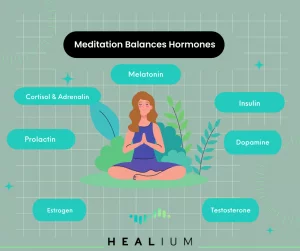




Meditation is one of the most popular techniques for reducing stress and maintaining your mental fitness. Here’s why you should start meditating right away.

While you’ve probably heard that meditation is a good practice, many people still don’t know why or how exactly it is beneficial. Meditation has the power to positively reshape the structure of our brains!
If you are curious about meditation, but find yourself routinely asking, “Why should I meditate?” this article is for you.
We’ll discuss the different long-term effects of meditation and how exactly these effects operate, as illustrated in research.
 Your brain is an incredible organ, capable of affecting much more than the muscles throughout your body. In fact, the biochemical makeup of your brain may have an even larger impact on your body’s functioning at large.
Your brain is an incredible organ, capable of affecting much more than the muscles throughout your body. In fact, the biochemical makeup of your brain may have an even larger impact on your body’s functioning at large.
That’s why it’s so important to strive for mental fitness, which is a mindset where you treat your brain like the muscle it truly is. This means exercising it regularly through the likes of meditation and neurofeedback so you maintain a proper balance of hormones & optimize your brainwaves.
– Cortisol & Adrenaline
Cortisol and adrenaline are both stress hormones, designed to put your body in tense “flight or fight” mode. When adrenaline is present in higher levels, your blood pressure rises along with your heart rate. Meanwhile, cortisol works to suppress your digestive system and increase your blood sugars.
While there’s certainly a time and place for these specific hormones, balancing their levels during the more normal periods of your day has become more important than ever. Stress at large has become the 21st century epidemic, estimated to be responsible for around 90% of all doctor’s visits.
Mindfulness exercises like meditation have been proven effective at lowering the levels of these hormones and eliminating stress from your life.
– Melatonin
Melatonin is the hormone responsible for keeping our sleep-wake cycles in check and regulating our body’s internal clock. The more melatonin our body produces, the easier it becomes for us to sleep.
Studies suggest that meditation may help increase our melatonin levels. This falls in line with previous research that indicates meditation helps improve sleep issues and reduce insomnia symptoms.
– Insulin
Researchers have noted that regular meditation positively affects risk factors for diabetes mellitus. In a 2006 study, regular transcendental meditation improved the blood pressure and insulin resistance of the patients.
Moreover, the lowered cortisol levels that regular meditation practice brings also allows the insulin in our bodies to work properly.
– Prolactin
Prolactin is another hormone our body produces more whenever we are exposed to stress. At high levels, it can potentially disrupt estrogen and progesterone balance, which in turn can affect our emotional regulation.
By improving our stress levels and responses, practicing meditation can help down-regulate prolactin production. In turn, this may help prevent infertility, acne, and irregular menstruation.
– Dopamine
Research findings suggest that meditation techniques raise our dopamine levels. Getting a surge of dopamine helps improve our memory, focus, and problem-solving capabilities.
Dopamine is one of the “happy hormones” our body releases when we exercise. It causes feelings of pleasure, motivation, and satisfaction. It essentially primes our brains for peak performance.
– Estrogen & Testosterone
Chronic stress and lack of sleep can suppress women’s estrogen levels and adversely influence men’s testosterone release. As such, regular meditation, which reduces stress and anxiety, can aid in raising estrogen and testosterone levels.
Moreover, studies indicated that practicing meditation may boost the production of DHEA or dehydroepiandrosterone. Aside from being an “anti-aging” hormone, DHEA helps produce other vital hormones, including estrogen and testosterone.

One popular benefit of meditation is reducing stress. In particular, a 2013 study noted that mindfulness meditation can help lower cortisol levels. As the main stress hormone in your body, cortisol works with several parts of your body to regulate your mood.
Research has also shown that meditation can help relieve stress as participants experience structural changes in their amygdala. This structure of cells lying in the middle of the brain are the ones responsible for stress, anxiety, and fear.
Meditation is referred to as a mind-body complementary medicine too. It allows you to experience a deep relaxation state and peace of mind. This is because when you meditate, you’re able to remove different conflicting thoughts that keep you preoccupied and give you stress and anxiety.
As a result, meditation can help you improve both your physical and emotional wellness.
In another study conducted in 2014, transcendental meditation, wherein you need to quietly repeat either a sound or word to help you remain focused, has been shown to help reduce teachers’ stress and burnout. By utilizing stress scales before and after the transcendental meditation program, the researchers found out that participants had lower stress levels and burnout.

According to the Centers for Disease Control and Prevention (CDC), around 70 million people in the U.S deal with chronic sleep problems.
So, if you’re wondering “why meditate?” it’s because the practice can help improve your sleep quality.
A 2015 study from JAMA Internal Medicine examined the effect of mindfulness meditation on 49 adults experiencing moderate sleep problems. Results revealed that the participants who practiced meditation had fewer symptoms of insomnia.
They also experienced less daytime fatigue. While sleep-related problems are often caused by worries and stress, researchers noted that meditation can enhance your relaxation response. Moreover, the practice facilitates better control of the autonomic nervous system. As a result, your tendency to be awakened quickly is mitigated.
Meditation improves levels of melatonin too, which has a crucial role in regulating sleep. In particular, slowing hepatic metabolism or amplifying synthesis in the pineal gland makes the increase of melatonin concentration possible. Then, meditation techniques can manage the blood flow of the brain’s executive regions during sleep. Given that meditation practices influence several brain functions positively, it creates mind and body harmony.
At Healium, we’ve developed an application specifically catered to improve your sleep quality through meditation. By combining virtual reality, neurofeedback devices, and sleep meditation experiences, Sleepium provides users with an actionable means to achieve better sleep.
Long-term effects of meditation include managing age-related memory loss too. For example, a meditation technique called Kirtan Kriyas has been shown to help improve the memory of individuals experiencing cognitive decline. Various meditation styles may also enhance the memory and attention of older adults.
Even people dealing with dementia can benefit from meditation’s ability to provide partial improvement of memory. At the same time, the family members who take care of individuals with dementia can manage their stress and cope more effectively through meditation.
A 2017 study on adults experiencing early memory loss reported that meditation practices, along with listening to music, can provide several benefits. These include boosting cognition, enhancing mood and the quality of life, and helping reverse memory loss in older adults suffering from subjective cognitive decline.
Practicing mindfulness meditation may also help you develop a better perception of life. A review on meditation programs, for instance, noted that meditation helps improve symptoms of depression among over 3,000 adults.
A study published in the Journal of Research in Personality emphasized that meditation exercises may mitigate the presence of negative thoughts. Meanwhile, another review noted the potential of meditation to combat depression by reducing cytokine levels. When you’re stressed, your body releases these inflammatory chemicals that may affect your mood and develop into anxiety and depression.
Meditation can help people combat addiction. For example, a 2013 review highlighted that mindfulness-based interventions can significantly lower the consumption of alcohol, cigarettes, cocaine, and other substances. The same review noted other studies that suggest the link between these interventions and reduced cravings.
Another 2014 study reported that meditation can mitigate the risk of substance abuse relapse. It supports your ability to fight the discomfort related to drug cravings and other negative effects, which means that long-term outcomes can be expected.
Given the mental discipline that you acquire from meditation, you can have more self-control. In turn, you become more aware of the things that trigger your addictive behaviors. With meditation, you can control your impulses and emotions better as well as redirect your focus, thus helping combat addiction.
A study conducted in 2018 also focused on the effect of transcendental meditation on individuals treated for alcohol use disorder. Results showed that this practice may help reduce alcohol use, alcohol cravings, and psychological distress.

Meditation practices have been around for thousands of years, and for good reason. While the mysteries of the brain are still being unraveled, there is solid scientific evidence reinforcing the long term benefits of meditation for your mental fitness and overall health of your brain.
These benefits include relieved stress levels, enhanced quality of sleep, improved age-related memory loss, better emotional health and empathy levels, and even help in combating addiction.
What’s more? The advances in modern technology are even further capitalizing on these benefits!
If you want to take your meditation experience to another level, find out how new technologies like virtual reality meditations even further enhance this millenia old practice.
 When supplemented with additional neurofeedback equipment, modern day virtual reality meditation has the power to optimize specific brainwaves, reduce stress, and increase your mental fitness as a whole. You can finally remove the mystery from meditation and track the improvements it’s making to your brain.
When supplemented with additional neurofeedback equipment, modern day virtual reality meditation has the power to optimize specific brainwaves, reduce stress, and increase your mental fitness as a whole. You can finally remove the mystery from meditation and track the improvements it’s making to your brain.
{“@context”:”https://schema.org”,”@type”:”FAQPage”,”mainEntity”:[{“@type”:”Question”,”name”:”Why Should You Meditate?”,”acceptedAnswer”:{“@type”:”Answer”,”text”:”Meditation is a highly successful, non-invasive and drugless alternative to traditional medicines that helps with a number of health issues including: stress and anxiety, balancing your hormones, sleep deprivation, memory loss, managing emotions and addiction.”}},{“@type”:”Question”,”name”:”Why Meditate Every Day?”,”acceptedAnswer”:{“@type”:”Answer”,”text”:”The benefits of meditation are felt the most when practicing a steady and consistent meditation routine. As you become more consistent with your practice, your brainwaves actually alter and your brain more easily reaches the flow state.”}},{“@type”:”Question”,”name”:”Should You Think When You Meditate?”,”acceptedAnswer”:{“@type”:”Answer”,”text”:”You will never be able to truly turn your brain off, which means you will undoubtedly stumble across random thoughts when you meditate. Successful meditation means acknowledging those thoughts and allowing them to pass. “}},{“@type”:”Question”,”name”:”What are the Benefits of Meditation?”,”acceptedAnswer”:{“@type”:”Answer”,”text”:”The benefits of meditation are almost too many to count! Benefits range from less stress and anxiety, to a greater sense of empathy and mindfulness, and even balanced hormone levels.”}},{“@type”:”Question”,”name”:”What are the Long Term Effects of Meditation?”,”acceptedAnswer”:{“@type”:”Answer”,”text”:”The biggest long term effect of consistent meditation is a greater sense of mental fitness for the user, meaning their mental health is in great shape, they experience less stress and anxiety, and can recognize and manage their own emotions. “}},{“@type”:”Question”,”name”:”How Long do the Effects of Meditation Last?”,”acceptedAnswer”:{“@type”:”Answer”,”text”:”The effects of meditation will often last for a few hours, although the method of meditation itself can lead to variation in this number. Fully immersive practices like virtual reality meditation lead to long-lasting effects as does consistent and routine meditation practice in general. “}}]}
Sarah Hill, a former interactive TV news journalist at NBC, ABC, and CBS affiliates in Missouri, gained recognition for pioneering interactive news broadcasting using Google Hangouts. She is now the CEO of Healium, the world’s first biometrically powered VR/AR channel, helping those with stress, anxiety, insomnia, and other struggles through biofeedback storytelling. With patents, clinical validation, and over seven million views, she has reshaped the landscape of immersive media.